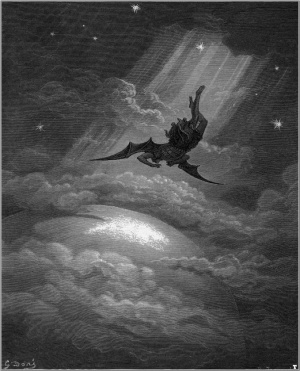Lucifer
From Textus Receptus
| Line 1: | Line 1: | ||
| - | [[Image:Paradise Lost 12.jpg|thumb|right|300px|The fall of Satan/Lucifer, | + | [[Image:Paradise Lost 12.jpg|thumb|right|300px|The fall of Satan/Lucifer, [[Gustave Doré]]'s illustration for ''Paradise Lost'' by [[John Milton]].]] |
| - | [[Gustave Doré]]'s illustration for ''Paradise Lost'' by [[John Milton]].]] | + | '''''Lucifer''''' is a name frequently given to [[Satan]] in [[Christian]] belief. This usage as a reference to a [[fallen angel]] stems from a particular interpretation of Isaiah 14:3-20, a passage that speaks of someone who is given the name of "Day Star" or "Morning Star" (in [[Latin]], ''Lucifer'') as fallen from heaven. 2 Peter 1:19 and elsewhere, the same Latin word ''lucifer'' is used of the morning star with no relation to Satan. However, in writings later than those in the Bible, the Latin word has often been used instead as a proper name for Satan. |
| - | '''''Lucifer''''' is a name frequently given to [[Satan]] in [[Christian]] belief. This usage as a reference to a [[fallen angel]] stems from a particular interpretation of | + | |
| - | In Latin, the word "Lucifer", meaning "Light-Bringer" (from ''lux, lucis'', "light", and ''ferre'', "to bear, bring"), is a name for the "[[Morning Star]]" (the [[planet]] [[Venus]] in its dawn appearances). | + | In Latin, the word "Lucifer", meaning "Light-Bringer" (from ''lux, lucis'', "light", and ''ferre'', "to bear, bring"), is a name for the "[[Morning Star]]" (the [[planet]] [[Venus]] in its dawn appearances). The Latin [[Vulgate]] version of the Bible used this word twice to refer to the Morning Star: once in {{bibleverse|2|Peter|1:19}} to translate the [[Greek language|Greek]] word Φωσφόρος (Phosphoros),<ref>The Greek word here, Φωσφόρος - from φῶς, meaning light - has exactly the same meaning of Light-Bringer that the Latin word has and once in Isaiah 14:12 to translate the Hebrew word הילל (Hêlēl). In the Greek translation of this passage ([[LXX]])the word used is Ἑωσφόρος - from ἔως, meaning dawn - which literally means Dawn-Bringer. In the latter passage the title of "Morning Star" is given to the tyrannous [[Babylon]]ian king, who the prophet says is destined to fall. This passage was later applied to the prince of the demons, and so the name "Lucifer" came to be used for [[Satan]], and was popularized in works such as [[Dante Alighieri]]'s ''Inferno'' and [[John Milton]]'s ''[[Paradise Lost]]'', but for [[English language|English]] speakers the greatest influence has been its use in the [[King James Version]] of {{bibleverse||Isa|14:12|KJV}} to translate the Hebrew word הילל, which more modern [[English translations of the Bible|English versions]] render as "Morning Star" or "Day Star". |
A similar passage in {{bibleverse||Ezekiel|28:11-19}} regarding the "king of [[Tyre, Lebanon|Tyre]]" was also applied to Satan, contributing to the traditional picture of Satan and his fall. | A similar passage in {{bibleverse||Ezekiel|28:11-19}} regarding the "king of [[Tyre, Lebanon|Tyre]]" was also applied to Satan, contributing to the traditional picture of Satan and his fall. | ||
Revision as of 15:17, 10 May 2009
Lucifer is a name frequently given to Satan in Christian belief. This usage as a reference to a fallen angel stems from a particular interpretation of Isaiah 14:3-20, a passage that speaks of someone who is given the name of "Day Star" or "Morning Star" (in Latin, Lucifer) as fallen from heaven. 2 Peter 1:19 and elsewhere, the same Latin word lucifer is used of the morning star with no relation to Satan. However, in writings later than those in the Bible, the Latin word has often been used instead as a proper name for Satan.
In Latin, the word "Lucifer", meaning "Light-Bringer" (from lux, lucis, "light", and ferre, "to bear, bring"), is a name for the "Morning Star" (the planet Venus in its dawn appearances). The Latin Vulgate version of the Bible used this word twice to refer to the Morning Star: once in {{#if:2|2 }}Peter 1:19 to translate the Greek word Φωσφόρος (Phosphoros),<ref>The Greek word here, Φωσφόρος - from φῶς, meaning light - has exactly the same meaning of Light-Bringer that the Latin word has and once in Isaiah 14:12 to translate the Hebrew word הילל (Hêlēl). In the Greek translation of this passage (LXX)the word used is Ἑωσφόρος - from ἔως, meaning dawn - which literally means Dawn-Bringer. In the latter passage the title of "Morning Star" is given to the tyrannous Babylonian king, who the prophet says is destined to fall. This passage was later applied to the prince of the demons, and so the name "Lucifer" came to be used for Satan, and was popularized in works such as Dante Alighieri's Inferno and John Milton's Paradise Lost, but for English speakers the greatest influence has been its use in the King James Version of {{#if:| }}Isa 14:12 to translate the Hebrew word הילל, which more modern English versions render as "Morning Star" or "Day Star".
A similar passage in {{#if:| }}Ezekiel 28:11-19 regarding the "king of Tyre" was also applied to Satan, contributing to the traditional picture of Satan and his fall.
See Also
Lucifer by Will Kinney

